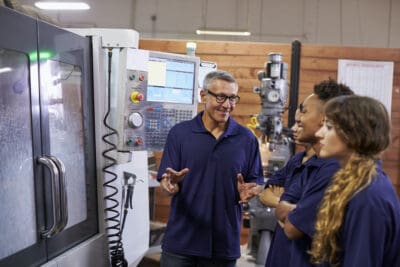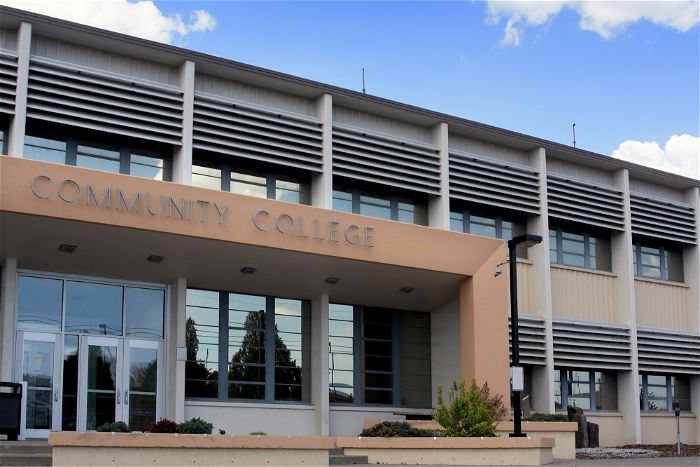
College and Career Preparation: A ‘Both/And’ Approach for Today’s Youth
January 18, 2022
At a Glance
Young adults shouldn’t have to face an either/or choice—get a job, or go to college? Secondary and postsecondary systems can help students pursue both academic and career goals by incorporating career and technical education offerings into their coursework.
As the pandemic enters a third year, the toll on today’s youth and their economic futures is mounting.
Disruptions to education systems and to the labor market are prompting young adults to question where they fit within the nation’s rapidly changing social and economic picture and what path to take forward. Many are hitting pause on their plans to pursue college, and an alarming number of young people are disengaging from school and work altogether.
According to recent surveys, young adults say they want more career relevant content and support infused in their educational experiences to ensure that the time and money they devote to learning pay dividends. Yet, helping young people reach their educational and employment goals in a unified, holistic manner is especially difficult because federal and state policies have historically treated college and career preparation separately and sometimes put them at odds with one another.
Young adults say they want more career relevant content and support infused in their educational experiences.
This episode of JFF’s When Policy Meets Practice podcast tackles head-on the false dichotomy that holds that individuals must choose between college or career and instead offers solutions for helping all young people acquire high-value postsecondary credentials and job-related skills so they can advance in the economy. The discussion largely focuses on the untapped potential of career and technical education (CTE) to help youth achieve academic and career success, and on the role CTE can play in driving stronger partnerships among K-12 systems, colleges, and employers.
Host Paul Fain digs into the topic with four leading practitioners: Shannon Cox, superintendent of Montgomery County Educational Service Center; Michael Baston, president of Rockland Community College; Luke Rhine, director of CTE at the Delaware Department of Education; and Carli Schiffner, deputy executive director of the Washington State Board for Community and Technical Colleges. At the end of the episode, JFF’s Charlotte Cahill and Crystal Green join Paul to offer their insights.
Kicking off the conversation, Shannon discusses the need to deconstruct the idea that people have to choose between attending college and pursuing a career. There shouldn’t be a question of either work or college, she says. Instead, the focus should be on what students are going to college for and how system leaders can help them achieve their goals. Early opportunities to explore careers are critical because they help students learn about employment options that match their aptitudes and interests. However, such programs require strong employer engagement to ensure that students get firsthand looks at in-demand occupations. And ideally, employers will see that taking the time to participate in these programs is a way of investing in their own future workforces, Shannon adds. Along the same lines, Michael notes that educators need to spend more time with students on identity development and putting purpose first. Moreover, he says, it’s very important to look for ways to bridge the gaps between K-12 and postsecondary systems to ensure that students can connect with CTE programs from high school and beyond.
Opportunities to explore careers are critical because they help students learn about employment options that match their aptitudes and interests.
Next up, Luke and Carli drill into policy strategies for strengthening career and technical education. Luke explains that data plays a key role in driving improvement in programs by deepening and expanding accountability models and producing insights that inform the design of student pathways. He goes on to say that simply helping students find jobs is not enough; instead, programs must ensure that students either get jobs that pay family-sustaining wages or advance to higher levels of education along an articulated career path—or both. Carli talks about Career Connect Washington (CCW), a career exploration program in the state of Washington that students can enter as early as middle school. A statewide initiative, CCW combines classroom learning with practical career experiences for youth and young adults to ensure that they are prepared for postsecondary education and the workforce. One of the key strategies has been to embed work-based learning into high school coursework that counts as dual credit for college level programs of study. CCW has helped foster partnerships and strengthen alignment across K-12 systems and higher education, and it has shown that investing in equipment and in wraparound services is essential to helping young people succeed, she says.
A Deeper Dive Into Career and Technical Education Policy
The four podcast guests were all members of a group of leading K-12 and postsecondary education practitioners that JFF recently brought together to develop a new policy agenda designed to promote the inclusion of career exposure and preparation activities into all educational pathways. Authored by JFF’s Policy Leadership Trust, the agenda centers on the critical role that CTE programs can play in helping young people develop their career identities. It includes profiles of promising approaches that are in place in several states, along with detailed federal and state policy considerations. JFF published the agenda earlier this month in a brief titled No Dead Ends: How Career and Technical Education Can Provide Today’s Youth With Pathways to College and Career Success.
How to Listen to Episode 9 of When Policy Meets Practice
Tune in to “Saving the Lost Generation: How Career and Technical Education Can Put Today’s Youth Back on a Path to Success,” the ninth episode of JFF’s When Policy Meets Practice podcast miniseries, for a discussion of the role of career and technical education can play in strengthening access to and success in college and careers for today’s youth. Joining host Paul Fain are secondary and postsecondary leaders Shannon Cox, Michael Baston, Luke Rhine, and Carli Schiffner. The conversation concludes with insights by JFF’s Charlotte Cahill and Crystal Green. The episode is now available on your favorite podcast platforms. You can see all other episodes here.
Related Content

When Policy Meets Practice Podcast Series
Series Trailer Paul Fain previews the podcast series, and JFF’s Lexi Barrett explains why policymakers should incorporate the views of on-the-ground practitioners in their policy strategies. Episode 10: Career Navigation Policy and Best Practices for…







